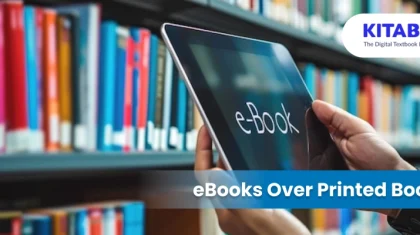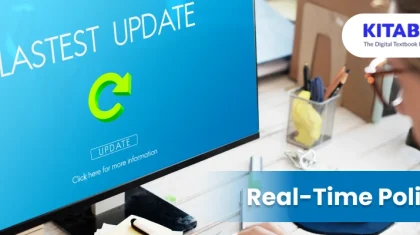
Online Reading or Offline? Which is Better for Learning? (2025)
Summarize this blog with your favorite AI:
Reading is undoubtedly the gateway to freedom. There has only been one avenue for reading for centuries: on paper.
That said, the digital age has opened the floodgates to information via the internet, and with over 85.88% of the world’s population owning smartphones, online reading has become the new normal.
The recent pandemic also played a significant role in thrusting the education systems worldwide into the digital realm, and this move was made possible by digital publishing platforms like KITABOO.
Table of Contents:
II. Offline Reading
III. Online Reading
Types of Reading - A Brief
Learning a language is the beginning of how we do almost everything in life. Even though reading comes third in terms of LSRW (listening, speaking, reading, and writing) skills when it comes to learning a new language, it gains the top spot in the field of education.
Explore: Digital Publishing Platform for Association and Societies
Most people subconsciously approach reading in two primary ways depending on what they are reading, which are:
- Extensive Reading: This technique is used when the reader is simply reading for pleasure. There is no aim or object here, and nor is the reader overly focused on the details.
- Intensive Reading: This is a reading technique used when a reader aims to consume information from what they are reading. It is a more in-depth and active approach requiring much more concentration. Intensive reading can be broken down into the following types:
- Scanning: This is a technique where one reads quickly through a large block of text while looking for specific keywords or pieces of information.
- Skimming: Skimming is a technique where you quickly glance through text to understand what the text is about.
- Critical Reading: Critical Reading is a technique used when a reader intends to understand the intricacies of what they are reading. This form of reading is all about analysis and is key to understanding complex information.
With this in mind, let’s dive into the nitty-gritty of offline and online reading.
Offline Reading
Let’s start with the obvious. No matter how intertwined we get with technology, it can never replace offline reading, and this holds true, especially in the field of education.
Reading and writing are a critical part of education and will continue to be into the future. While the benefits of online reading do exceed offline reading, it still has a few aces up its sleeve.
The Advantages of Offline Reading
Although considered old-fashioned, offline reading does boast numerous advantages, such as:
Well, It’s Offline
As the title suggests, good old-fashioned books do not require an internet connection. With this comes the added advantage of not having a device to read from that can be hacked, broken, or worry about running out of juice.
Better Focus Due to Minimal Distractions
Offline reading allows for higher levels of focus due to minimal distractions.
With smart devices comes a barrage of notifications and the temptation to switch to a different app. When you sit with a book, you sit with the intention to read, and you automatically switch into an intensive reading mode.
You Get a Break from Screens
Most of us spend a large chunk of our day staring at either a smartphone, a laptop, or a television. This can put a significant amount of strain on one’s eyes.
But when it comes to offline reading, as long as you are reading in a well-lit space, you don’t strain your eyes as much.
The Downsides of Offline Reading
Offline reading does have its downsides as well, such as:
A Lack of Interactivity
Reading large chunks of text can get mundane over a period of time. Add to this the fact that not every one of us learns best from reading and you can see how its merits start to drop.
Statistics show that over 65% of the world’s population are visual learners. Relying only on offline learning leaves a large chunk of the student population at a disadvantage.
Offline Reading is Limited in its Scope
Offline reading limits your scope of knowledge to the book or books you access to. Unless you have access to a library, getting more information solely from books can be an expensive endeavor.
Online Reading
Based on the current landscape, it is evident that digital content creation is going to continue into the foreseeable future.
Reading online has become the go-to option for getting the latest news, reading up on new topics, and, since the pandemic, a large part of the education system.
So, how does reading online fare in comparison to reading offline? Let’s find out.
The Advantages of Reading Online
Reading online has changed the very fabric of how we consume and interact with information. With it comes a host of advantages, such as:
Access to All the Information in the World
Online reading gives you access to infinite amounts of information, which, unlike offline reading materials, can be up to date with the latest information.
You no longer need to buy additional books or run to the library and spend additional time and effort looking for relevant sources of information.
It is a Multimedia-Rich and Interactive Experience
Depending on the source material, online reading can be infused with multimedia-rich elements that are proven to make comprehension of complex topics easier and boost knowledge retention.
The interactive nature of these materials also leads to higher engagement levels in students.
Improves Scanning and Skimming Reading Skills
Reading online is often visually cluttered, and readers scan and skim more often to find the necessary information.
As a result, readers tend to develop these skills quickly to identify the key information and ignore the less important details.
Online Reading is More Accessible
Reading online transcends the limitation of offline reading when it comes to accessibility.
Whether a reader is visually impaired or hard of hearing, online reading has technology like Closed Captions and text-to-speech to overcome them.
Also Read: Best eBook Creation Softwares
The Downsides of Online Reading
As with everything, there is always a flip side, which also holds true for online reading. Here are the disadvantages of reading online:
Too Many Distractions
Reading online does come with several distractions in the form of ads, pop-up notifications, and social media, to name a few, which can make it difficult to focus on the task at hand.
Due to this, studies have often found that readers then skim rather than critically read online.
The Health Implications
Staring at a screen for extended periods puts a lot of strain on one’s eyes. You can also strain your neck or back if you do not maintain a proper posture while spending extended time on online devices.
Is it Better to Read from Books or Online?
Reading online does pull ahead of reading offline in terms of its benefits. However, there is no one correct answer to this question.
Instead of an either this or that approach, the best possible course of action is to maintain a careful balance of both, especially in the field of education. That way, readers reap both forms’ benefits while negating each other’s downsides.
If you prefer reading online and want to help create or read eBooks, you should check out KITABOO. They are a cloud-based platform that supports various digital publishing needs. Explore now to know more.
Contact our expert team now and get started!
To know more, please write to us at contact@kitaboo.com.
Suggested Reads:
- Advantages of ePUB over PDF
- Create a Custom eBook App to Reach a Wider Audience
- What is eBook DRM and Why Do Publishers Need it?
- Role of Technology in the Workplace
- Best eBook Hosting Platforms for Digital Publishing
- Create Effective Interactive Training Content
- Evaluate Training Effectiveness and Impact
- K12 Publishers
- Associations & Societies
- Trade Publishers
- Training Companies
- Content Aggregators
Discover how a mobile-first training platform can help your organization.
KITABOO is a cloud-based platform to create, deliver & track mobile-first interactive training content.



